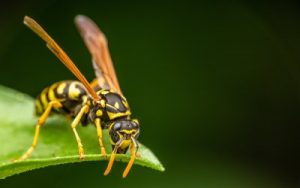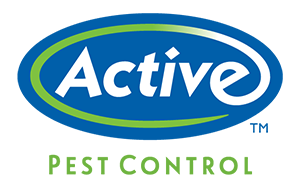How to Prevent Wasps and Bees – and How to Avoid Getting Stung
Serving Atlanta Metro | Columbus | Augusta | Savannah
 Living in Georgia, you quickly learn that the best way to deal with stinging insects is to prevent them from nesting on your property in the first place. This is because it’s almost always easier to do preventative maintenance beforehand than it is to knock down a nest, deal with the fallout, and make sure the stinging insects don’t come back.
Living in Georgia, you quickly learn that the best way to deal with stinging insects is to prevent them from nesting on your property in the first place. This is because it’s almost always easier to do preventative maintenance beforehand than it is to knock down a nest, deal with the fallout, and make sure the stinging insects don’t come back.With that in mind, the experts at Active have put together this practical guide to preventing wasps, bees, and other stinging insects, and how to reduce your risk of getting stung.
Preventing Stinging Insects in Your Yard
As with all types of pests, the key to prevention is making your property less attractive than others. So, what attracts stinging insects to your property? Food, water, and shelter.
Here are a few basic tips that can help ensure they don’t find these things on your property:
- Don’t Give Them Access to Food: This can be a problem because whether it’s barbecues, picnics, or kids with ice cream, eating food outside is a part of summer. Put away food and drinks promptly after eating a meal outside. Keep sugary drinks closed or covered to keep wasps out. When you put food or food-related trash in a trash can, close the lid securely.
- Eliminate Standing Water: Eliminating excess moisture can help you avoid all kinds of pests, both indoors and out. All pests need to drink water, so if they can’t find it on your property, they’ll have to go somewhere else to find it.
- Debris, Waste, and Vegetation: Maintain a tidy yard. Stinging insects like areas with lots of debris and waste. So, keeping your yard clean can prevent them from building nests.
Prevent Bees and Wasps in Your House
What’s worse than wasps nesting in your yard? Wasps nesting in your house. It sounds like a nightmare scenario, yet it’s a lot more common than you would think. Here’s how you can protect against it and what you should do if it happens:
- Seal up cracks on the side of your home and patch up loose siding.
- Wasps and hornets like to find these crevices and build nests there, and sometimes they can ultimately end up entering your home through these tiny holes.
- Once stinging insects get inside your home you will most certainly need immediate assistance from a pest control specialist to help rid of them from your home.
Say Goodbye to Pest Problems for Good!
*During normal business hours. After hours inquiries will be returned the next business day.
Can You Repel Wasps, Bees, and Hornets Naturally?
Yes, there’s evidence that planting certain plants in your garden can affect bees and wasps. If you want to discourage bees and wasps from your property, consider planting some of these plants that they hate – and see if any of the plants that they love are lurking nearby.
Alternatively, if you’re trying to attract pollinators, you can plant some of these plants that they love.
Plants That Bees and Wasps Hate
- Basil
- Citronella
- Eucalyptus
- Geraniums
- Marigolds
- Peppermint
- Spearmint
- Thyme
- Wormwood
Plants That Bees and Wasps Love
- Black-eyed Susan
- Honeysuckle
- Lantana
- Lilacs
- Perennial Yarrow
- Poppies
- Pale Purple Coneflower
- Sweet Fennel
- Wisteria
- Queen Anne’s Lace
- Sedum
- Snapdragon
- Sunflowers
How to Avoid Getting Stung
If your prevention efforts aren’t working and you still have wasps, hornets, or bees on your property, you probably want to know what you can do to reduce your risk of getting stung.
- Avoid wearing sweet fragrances. Bees and wasps are more active in the spring and summer when the flowers have bloomed. If you’re wearing sweet-smelling lotion or perfume, they might confuse you for a plant that’s ready to pollinate, making you more likely to be stung.
- Keep food and drinks covered. Aggressive wasps, such as yellow jackets, enjoy sweets and carbohydrate foods and will pester you during a picnic. They may also get inside soda cans and give you a real surprise as you take a drink. Keeping your food covered or eating within an enclosed screen can help reduce the bee and wasp threat.
- Wear shoes when outdoors. Bees and wasps will sting when stepped on. Always wear shoes when walking around outdoors to prevent a painful encounter.
- Don’t swat at them or make sudden movements. These actions are more likely to make them feel threatened. Bees and wasps will rarely sting unless they feel threatened, which is usually a byproduct of nesting in human areas. If you can prevent them from nesting on your property, you can dramatically reduce your risk of getting stung. If you do find a nest, call a professional for nest removal.
Bee, Wasp, and Hornet Prevention and Control
At Active Pest Control, we’re proud to be a leading authority in bee, wasp, and hornet control in the region. With a deep understanding of what attracts these stinging pests to your property and how to safely repel them, our team of experts is equipped with the knowledge and tools to ensure your home remains a sting-free zone.
Don’t let the threat of stings disrupt your summer — call us today to discuss removal and prevention solutions.
Back to Bee, Wasp, & Hornet Exterminators, Control & Removal
How to Prevent Wasps and Bees – and How to Avoid Getting Stung in Georgia
Serving Your Pest Needs for Over 35 Years Across Georgia
McDonough | Conyers | Lawrenceville | Alpharetta | Marietta | Columbus
Newnan | Locust Grove | Rome | Atlanta | Brunswick | Byron | Augusta | Savannah
Home » Bee, Wasp, & Hornet Exterminators, Control & Removal » How to Prevent Wasps and Bees – and How to Avoid Getting Stung

